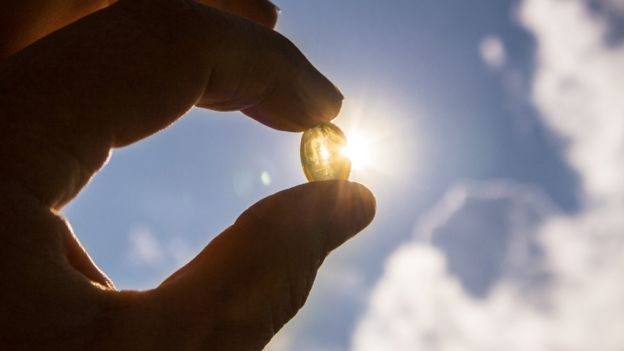There are mounting questions about whether vitamin D has a role to play in the fight against coronavirus.
Several organisations, including the health watchdog the National Institute of Health and Care Excellence (NICE), are now reviewing the evidence.
What is the advice?
With more people staying indoors during the pandemic, some people may have been deprived of vitamin D.
Normally, many of us get it by spending time outside. Our skin makes it when exposed to the sun.
The NHS says people should consider taking 10 micrograms of vitamin D a day during this time - particularly if they spend most of their time inside.
Before the pandemic people in the UK were already advised to consider taking supplements during the winter months (from October to March).
Meanwhile Public Health England recommends vitamin D throughout the year if:
- you are not often outdoors
- you live in a care home
- you usually wear clothes that cover up most of your skin when outside
People with dark skin may also not be getting enough, even if they spend time outdoors, and should consider an all-year-round supplement.
Scottish and Welsh governments and Northern Ireland's Public Health Agency have issued similar advice for the lockdown period.
Why do we need vitamin D?
It is well known that vitamin D is important for healthy bones, teeth and muscles. A lack of it can lead to a bone deformity illness called rickets in children, and a similar bone weakness condition called osteomalacia in adults.
There are also suggestions that vitamin D boosts the immune system and helps fight off infections.
Some studies suggest ensuring adequate vitamin D levels help when we have common colds and flu, for example. But evidence from research is inconsistent.
The Scientific Advisory Committee on Nutrition (SACN) is now reviewing studies looking at the impact of vitamin D on chest infections.
Can it stop coronavirus?
According to the NHS there is currently not enough evidence to support this.
But experts do think that it may have some broader health benefits during the pandemic.

According to a report in BMJ Nutrition, Prevention and Health, "As a key micronutrient, vitamin D should be given particular focus - not as a 'magic bullet' to beat COVID-19, as the scientific evidence base is severely lacking at this time - but rather as part of a healthy lifestyle strategy to ensure that populations are nutritionally in the best possible place."
Some researchers have suggested that vitamin D deficiency might be linked with poorer outcomes if someone catches coronavirus. But other underlying risk factors, such as heart disease, are common in these patients too, making it hard to draw conclusions.
Prof Jon Rhodes, Emeritus Professor of Medicine at the University of Liverpool, says vitamin D has anti-inflammatory effects, and there is some research that suggests it may dampen down the body's immune response to viruses.
This could be relevant in very ill coronavirus patients where severe lung damage can result from an inflammatory "cytokine storm" in response to the virus, he says, although much more research is needed to explore this.
Should I take lots of it?
No. Although vitamin D supplements are very safe, taking more than the recommended amount every day can be dangerous in the long run.
If you choose to take vitamin D supplements:
- Children aged one to 10 should not have more than 50 micrograms a day
- Infants (under 12 months) should not have more than 25 micrograms a day
- Adults should not have more than 100 micrograms a day, with the recommended amount 10 micrograms a day
Latest Stories
-
Meet 2 Ghanaian entrepreneurs on a mission to connect 1m African professionals to global companies by 2034
15 mins -
NCA approves Starlink’s satellite broadband application
16 mins -
Government orders FGR to revamp mining operations; assures workers of commitment to their welfare
22 mins -
Arne Slot philosophy could suit Liverpool – Van Dijk
32 mins -
EC replies Mahama: You also appointed someone who was tagged NDC
39 mins -
See colourful outdoor of Prof Naana Opoku-Agyemang as NDC’s running mate
1 hour -
Akufo-Addo commissions 15MWP Kaleo Solar Power Plant
1 hour -
GCB Bank PLC leads African financial integration, hosts ZICB delegation
1 hour -
Empowering Girls in ICT: FAWE Ghana advocates for gender equality in the Tech sector
3 hours -
Rangnick ‘contacted by Bayern Munich’ about manager job
3 hours -
Winneba Youth Choir celebrates 35th Anniversary with Aseda Concert sponsored by Fidelity Bank
3 hours -
Bonwire residents reject Agya Koo’s endorsement of Ejisu NPP MP aspirant
3 hours -
SSNIT to run out of reserves due to deficits – ILO
3 hours -
Lagos officials eye Jospong Group’s eco-friendly waste management module
3 hours -
Photos: NDC outdoors Prof Naana Opoku-Agyemang as running mate
3 hours

